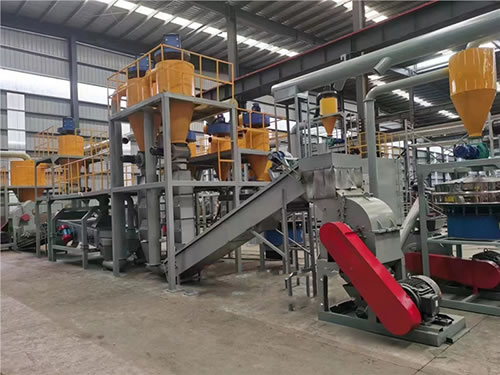Authentic Henan brand lithium iron phosphate battery recycling and processing equipment consolidates the foundation of Malaysias mobile phone lithium battery recycling industry
Ranking of cities in Malaysia is as follows:
1. **Kuala Lumpur**: It is the capital and the largest city of Malaysia, and it is also the most famous city in the country. Kuala Lumpur is an international metropolis with great influence on the culture, education, sports, finance, economy, commerce, and finance of Southeast Asia.
2. **George Town**: It ranks second among Malaysian cities. As a port city, George Town plays an important role in Malaysia's foreign trade and economic exchanges. It is also known for its well-preserved historical architecture and unique cultural heritage.
3. **Ipoh**: Known as a "city of a hundred islands", Ipoh has beautiful natural scenery and rich cultural resources. It is an important tourist destination in Malaysia and also has certain economic strength in industries such as manufacturing and services.
4. **Johor Bahru**: It is the second largest city in Malaysia and is located near Singapore. Johor Bahru is an important center for Malaysia's manufacturing, trading, and transportation industries, and has close economic ties with Singapore.
In general, the ranking of cities in Malaysia will be affected by different evaluation standards and data sources, and there may be some differences.

The industrial chain for recycling mobile phone lithium batteries includes the following links:
1. **Recycling and Collection**:
- **Consumers**: Individuals or enterprises that discard or replace old mobile phones with new ones, becoming the primary sources of recycled batteries.
- **Collection Stations**: Facilities set up by manufacturers or third parties to collect used batteries from consumers.
2. **Sorting and Preliminary Treatment**:
- **Manual Sorting**: Used to separate different types and brands of batteries based on their appearance, size, and other characteristics.
- **Automated Sorting**: Using advanced equipment such as spectrometers and X-ray machines to identify the chemical composition and structural characteristics of the batteries for more accurate sorting.
- **Disassembly**: Disassembling the battery housing to remove the electrodes, separators, and electrolytes inside.
3. **Pyrolysis System**:
- In a high-temperature, oxygen-free environment, organic components in the battery are pyrolyzed into gases, while inorganic components such as metals remain. This step helps further purify the materials and prepare them for subsequent processes.
4. **Material Extraction and Refining**:
- **Physical Methods**: Techniques like mechanical crushing, magnetic separation, and gravity separation are used to extract valuable metals and other materials from the black mass.
- **Chemical Methods**: Acid leaching, solvent extraction, and other methods are employed to dissolve and separate the target substances from the black mass.
- **Electrochemical Methods**: Through electrolysis or electrodialysis, metal ions are extracted from the solution and deposited onto the electrodes for recovery.
5. **Production of Raw Materials**:
- The refined materials undergo processes such as smelting and refining to produce high-purity raw materials suitable for manufacturing new batteries or other products.
6. **Remanufacturing Batteries**:
- The recovered raw materials are used to manufacture new lithium batteries, which can be reused in mobile phones or other electronic devices.
In summary, the industrial chain for recycling mobile phone lithium batteries is a complex process involving multiple stages and technologies. Each stage plays a crucial role in ensuring the efficiency, safety, and environmental sustainability of the entire process. With the increasing focus on environmental protection and resource conservation, this industry is expected to continue growing and evolving in the coming years.

# Discussion on Environmental and Safety Issues of Phosphoric Acid Lithium Battery Recycling and Treatment Equipment
Phosphoric acid lithium batteries are widely used in various fields. However, the recycling and treatment equipment for these batteries bring about environmental and safety concerns.
From an environmental perspective, improper recycling can lead to the leakage of harmful substances such as heavy metals and electrolytes. These pollutants may contaminate soil and water sources, posing a threat to ecological balance. For example, if the waste liquid from battery dismantling is not properly treated, it may cause eutrophication of water bodies, affecting aquatic life.
In terms of safety, the recycling process involves high-temperature and high-pressure operations. If the equipment is not well-designed or maintained, there is a risk of explosion and fire. Additionally, workers may be exposed to toxic chemicals, which can harm their health. Therefore, it is crucial to develop advanced and safe recycling and treatment technologies, and to strictly regulate the operation of related equipment to minimize environmental and safety risks.
Generally speaking the application of lithium iron phosphate battery recycling and processing equipment in the recycling and reuse of mobile phone lithium batteries in Malaysia is of great significance. It can not only improve the production efficiency and quality of enterprises related to the recycling and reuse of mobile phone lithium batteries in Malaysia reduce production costs but also promote the development of enterprises for the recycling and reuse of mobile phone lithium batteries. However there are also some problems in the application of lithium iron phosphate battery recycling and processing equipment in the industry of recycling and reusing mobile phone lithium batteries which need further research and solution. In the future with the progress of science and technology the performance of lithium iron phosphate battery recycling and processing equipment will be further improved and its application in the industry of recycling and reusing mobile phone lithium batteries will be more extensive. To Malaysian customers of mobile phone lithium battery recycling and reuse during negotiations we have deeply realized the importance of win-win cooperation and look forward to working hand in hand with you to create a better future.